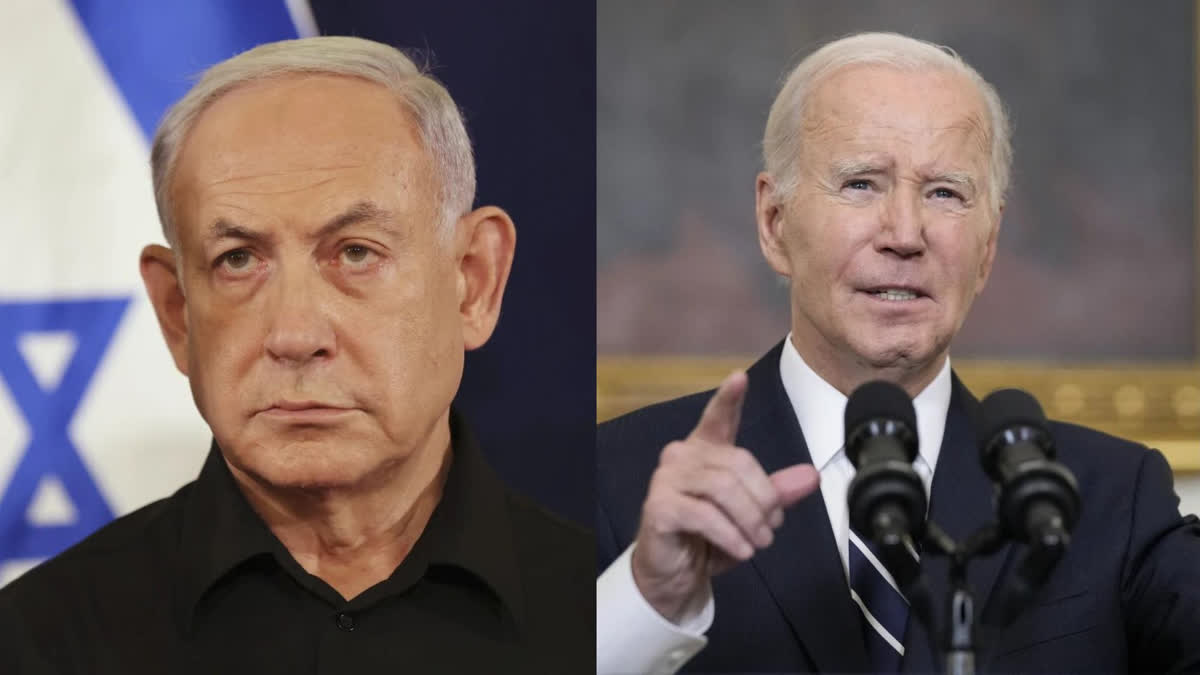Rafah (Gaza Strip) : Israel and the United States on Tuesday showed their sharpest public disagreement yet over the conduct and future of the war against Hamas as the two allies became increasingly isolated by global calls for a ceasefire. The dispute emerged while Israeli forces carried out strikes across Gaza, crushing Palestinians in homes.
President Joe Biden said he told Prime Minister Benjamin Netanyahu that Israel was losing international support because of its indiscriminate bombing and that Netanyahu should change his government, which is dominated by hard-right parties.
Biden's comments came as the White House national security adviser heads to Israel this week to discuss with Netanyahu a timetable for the war and what happens if Hamas is defeated. Defense Secretary Lloyd Austin will travel to Israel next week for a visit the Pentagon said aims to show US support for Israel but also to press the need to avoid more civilian casualties in Gaza.
The war ignited by Hamas' Oct. 7 attack into southern Israel has already brought unprecedented death and destruction to the impoverished coastal enclave, with much of northern Gaza obliterated, more than 18,000 Palestinians killed and over 80% of the population of 2.3 million pushed from their homes. The US has urged Israel to do more to reduce civilian casualties since it launched its invasion of southern Gaza at the beginning of the month. But the toll has continued to mount at seemingly the same dizzying rate.
The health care system and humanitarian aid operations have collapsed in large parts of Gaza, amid Israel's blockade of the territory and intense airstrikes and fighting, and aid workers have warned of starvation and the spread of disease among displaced people in overcrowded shelters and tent camps.
Gaza City and much of the surrounding north have already suffered widespread destruction from more than two months of bombardment. Amid the rubble, Israeli ground troops are still locked in heavy combat with Palestinian fighters, more than six weeks after soldiers invaded the north. Fierce clashes raged Tuesday in Gaza City's Zaytoun and Shijaiya neighbourhoods, as well as in Jabaliya, a densely built urban refugee camp, residents said.
Tens of thousands of Palestinians remain in the north, huddled in homes or in UN schools-turned-shelters. As airstrikes and drones smash houses, first responders are unable to reach anyone buried in the wreckage, residents said. It was massive, Mustafa Abu Taha, an agricultural worker, said of the sound of gunfire and explosions in Shijaiya, where he lives.
Amal Radwan, a woman sheltering in a school in Jabaliya, said the situation was catastrophic, as Israeli troops tried to advance deep into the district and unleashed heavy fire against fighters. Whenever the resistance hit them, they hit us very hard. It has become crazy. They strike everywhere with no regard to women or children, she said.
Outside Gaza City, Israeli troops using a controlled detonation blew up a school run by UNRWA, the UN agency for Palestinian refugees, in the northern town of Beit Hanoun. Footage posted online showed soldiers cheering as they watched the building collapse in a giant blast and pall of smoke. UNRWA chief Phillippe Lazzarini confirmed the demolition in a post on X Tuesday, calling it outrageous. There was no immediate comment from the Israeli military. On Saturday, it said militants opened fire from inside an UNRWA school in the town.
Israel also has begun flooding some Hamas tunnels, a US official confirmed Tuesday, speaking on condition of anonymity because they were not authorized to discuss the action. Israelis said they are testing the targeted flooding of tunnels on a limited basis and are exploring the idea as one of a range of options to degrade the tunnel network, according to another US official familiar with the matter.
President Joe Biden said during a news conference with Ukrainian President Volodymyr Zelenskyy that there were assertions that no hostages were in Gaza tunnels being flooded with seawater by the Israelis, but I don't know that for a fact. Biden's comments were a startlingly direct criticism of Israel even as his administration continues to give unwavering diplomatic and military support for the military campaign in Gaza in the face of mounting international outrage.
The UN secretary-general and Arab states have rallied much of the international community behind calls for an immediate cease-fire. But the US vetoed those efforts at the UN Security Council last week as it rushed tank munitions to Israel to allow it to maintain the offensive. A nonbinding vote on a similar resolution at the UN General Assembly passed overwhelmingly Tuesday. The vote demanding a ceasefire is largely symbolic, but it serves as an important barometer of world opinion.
Israel launched the campaign after Hamas and other militants streamed into the south on Oct. 7, killing some 1,200 people and taking about 240 others hostage. About half of those remain in captivity. At least 105 Israeli soldiers have died in the ground offensive, the army says.
Israel and the US say any ceasefire that leaves Hamas in power would mean victory for the militant group, which has governed Gaza since 2007 and has pledged to destroy Israel. Israel blames civilian casualties on Hamas, saying it positions fighters, tunnels and rocket launchers in dense urban areas, using civilians as human shields.
Read More
- Biden says progress on India-Middle East-Europe Economic Corridor could be one of the reasons for Hamas' attack on Israel
- Hamas no different from ISIS, Al Qaeda: Israel envoy at UN
